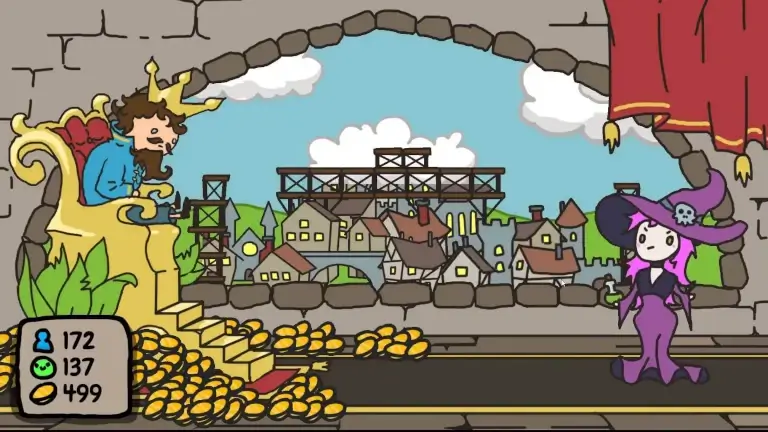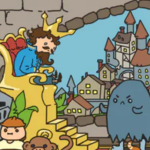

Favourite Games
Sort the Court!

Sort the Court! is a decision-making simulation game where players take on the role of a monarch presiding over an ever-growing medieval town. As ruler, players are presented with a series of binary choices, each delivered by town citizens, advisors, and occasional mysterious visitors. Every decision made by the player impacts the town’s wealth, population, and happiness. Simple yet impactful choices determine the progress and health of the kingdom, requiring players to weigh the short-term benefits against long-term development.
Players start with a modest kingdom, but as they interact with their subjects and make key decisions, the kingdom either flourishes or flounders. Decisions range from basic economic choices like investing in local businesses or funding public festivities, to moral dilemmas involving the fates of individual citizens or diplomatic choices affecting international relations. The game’s charm lies in its simplicity and the immediate feedback loop of decision-making consequences.
Growing Complexity in Governance
As the game progresses, the decisions become increasingly complex and the stakes higher. Players must manage their resources and their relationships with different community factions and external entities. Random events throw additional challenges into the mix, such as natural disasters, bandit attacks, or enigmatic prophecies that require interpretation and action.
The growth of the town introduces new characters, each bringing their unique perspectives and needs. These characters often return, remembering previous interactions and reacting according to the history of decisions made by the player. This continuity adds depth to the gameplay, as players build ongoing relationships that help shape the narrative and outcomes of their rule.
The Balance of Power and Prosperity
Successful management of the kingdom requires a balanced approach to governance. Economic prosperity must be weighed against the happiness of the citizens and the population’s growth. Decisions that favor one aspect might negatively impact the others, creating a dynamic puzzle of priority and compromise. For example, taxing the people heavily might fill the royal coffers but at the cost of public satisfaction and morale.
Over time, players can unlock new buildings and upgrades for their kingdom, which can provide additional options and benefits. Each investment changes the landscape of the kingdom visually and functionally, reinforcing the sense of personalization and growth. These developments can lead to new types of decisions, further expanding the strategic aspect of the game.
Sort the Court! offers players a whimsical yet thought-provoking look at leadership and the complexities of ruling. With its straightforward mechanics, the game is accessible yet engaging, providing a platform for players to experiment with different styles of governance. As each choice brings visible changes to the kingdom, players experience the tangible impact of their leadership, making each playthrough uniquely satisfying and challenging.
Frequently Asked Questions and Tips for Playing Sort the Court
How do I increase my kingdom’s wealth in Sort the Court?
To increase wealth, make decisions that favor economic growth, such as investing in businesses or approving trade deals. Avoid spending excessively on festivals or giving away gold without securing a return on investment.
What is the best way to maintain high happiness among my citizens?
Keep happiness levels high by making decisions that benefit the citizens, like hosting festivals or making community-enhancing decisions. Also, responding favorably to individual requests from citizens can boost morale.
How can I attract more people to my kingdom?
Population growth can be encouraged by creating a welcoming environment through decisions that promote safety and prosperity. Additionally, certain characters offer opportunities to invite more settlers or birth new citizens.
What should I do when I encounter a mysterious visitor?
Mysterious visitors often present high-risk, high-reward scenarios. Consider the potential long-term effects of their proposals on your kingdom’s wealth, population, and happiness before deciding.
How do I handle natural disasters in the game?
Natural disasters typically require a choice between spending resources to mitigate damage or saving resources at the expense of popularity and safety. Prioritizing the reconstruction efforts after a disaster can help recover any losses in happiness or population.
Are there any negative consequences to continually refusing requests?
Continuously refusing requests can lead to decreases in happiness and may prevent certain beneficial opportunities from arising. Balancing “yes” and “no” decisions is key to maintaining a healthy, thriving kingdom.
Can decisions affect the appearance of my kingdom in Sort the Court?
Yes, certain decisions will lead to physical changes in your kingdom, such as the construction of new buildings or the appearance of special characters. These changes can enhance the functionality and aesthetics of your kingdom.
Is there an end to the game, or can I play indefinitely?
Sort the Court can be played indefinitely, but reaching certain milestones or achieving a particularly balanced and prosperous kingdom might feel like a natural conclusion for some players. Each session can offer new scenarios and decisions, making each playthrough unique.
Discuss Sort the Court!
















